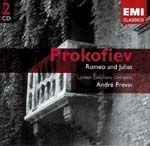Try to tear yourself away from Act 1, Scene 1 of this classic recording, the most passionate of all full-length ballet scores. Just try it. In a word, André Previn and the London Symphony Orchestra are riveting. The intensity continues throughout this budget-priced two-CD set. Previn, his career as a film composer/conductor less than a decade behind him when this music was recorded in 1973, finds the maximum dramatic value of just about all of the ballet’s 50-odd numbers. With the LSO in fine form and responding well to a conductor it had been working with for several years, this is a very welcome return to the active catalogue and can be recommended without hesitation.
But wait. In the very same month Lorin Maazel led the Cleveland Orchestra for Decca, and got results no less fine than Previn’s. That recording also is currently available on a budget-priced two-disc set. If Previn gives priority to the drama of each moment, Maazel attends first to the symphonic structure of the score, which uses Wagner’s technique of leading motives. By paying particular attention to the way these themes grow and interact as the tragedy gathers, Maazel ultimately reaches his discs’ high point at the final scenes.
For example, all three sword-fights feature the same flurrying string figurations but ultimately go different ways depending on the outcomes of the duels. Previn’s treatments achieve powerful results within particular scenes, but in Maazel’s performance, each fight is more tense than the prior one until finally two deaths result. This outcome, which seals Romeo and Juliet’s fate, is more telling under Maazel. At a more sublime level, Maazel’s performance is superior in tracing the growth of Juliet, from carefree and girlish, through her realization of her womanhood, to her love and suicide.
If you want to get just one recording, here are the bottom-line distinctions between them: Previn’s has more thrilling moments; Maazel’s has the more unified artistic experience and better playing overall. Previn’s sound is just a little fresher than Maazel’s in this remastering. For me, it is the awesome playing of the Cleveland Orchestra, particularly in the brass, that marginally tips my preference to Maazel.
































